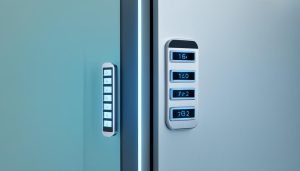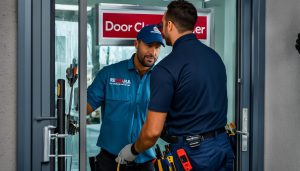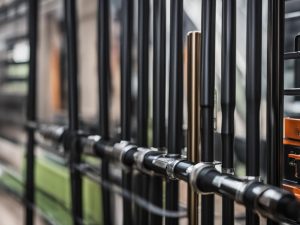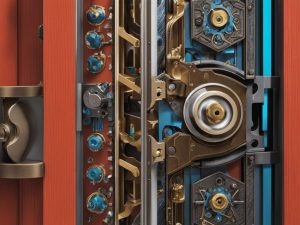Welcome to our guide on door repair basics. Whether you’re dealing with sticking doors or damaged door frames, knowing how to identify common issues and their solutions is essential for maintaining the security and functionality of your doors. In this article, we’ll provide you with valuable insights and tips to help you address door repair problems effectively and ensure a safe and aesthetically pleasing environment in your home or office.
Key Takeaways:
- Regular door repair prevents further damage and costly replacements.
- Addressing sticking doors and damaged door frames is crucial for maintaining security and aesthetics.
- Door repair enhances the curb appeal of your property and ensures a safe environment.
- Identifying root causes and implementing appropriate solutions restores optimal door functionality.
- Repairing doors saves money and avoids unnecessary replacements.
The Importance of Door Repair
Door repair is important for various reasons. It ensures security and privacy by preventing unauthorized access. It saves money and avoids costly replacements by addressing minor issues promptly. Well-maintained doors enhance the aesthetic appeal of a space. Regular maintenance and repairs contribute to the overall safety and comfort of a building.
Understanding Door Repair
Door repair is an essential aspect of maintaining the functionality, aesthetics, and security of doors. Whether it’s a residential or commercial space, addressing door issues promptly is crucial to ensure optimal performance and prevent further damage. By identifying the root causes and implementing appropriate solutions, you can restore the functionality and enhance the security of your doors.
One key aspect of door repair is addressing damaged door frames. A damaged frame can lead to misalignment and security vulnerabilities, compromising the overall integrity of the door. Repairing the door frame is just as important as fixing the door itself.
When it comes to damaged doors, it’s worth noting that not all doors need to be replaced entirely. In many cases, repairs can be done to fix the specific issues, saving you time and money. Repairing a door instead of replacing it entirely also helps to maintain the visual aesthetics of your space.
Functionality is a critical aspect that door repair aims to restore. This involves ensuring that the door opens and closes smoothly, without sticking or dragging along the floor. Misaligned hinges, worn-out hardware, or issues with the door’s balance can affect its functionality. Addressing these issues promptly helps keep your doors in optimal working condition.
Another crucial consideration in door repair is security. A damaged or malfunctioning door can compromise the safety of your space, allowing unauthorized access or making it easier for intruders to break in. By investing in door repair, you enhance the security features of your doors and maintain a safe environment.
Common Door Repair Issues:
- Sticking doors
- Sagging doors
- Warped doors
To gain a better understanding of how door repair works, it’s important to consider each individual issue and explore the appropriate remedies. Addressing these issues promptly will help maintain the functionality, aesthetics, and security of your doors.
| Common Door Repair Issues | Solutions |
|---|---|
| Sticking doors | Adjusting hinges, repairing the door frame, improving alignment |
| Sagging doors | Replacing hinges, reinforcing the door frame, redistributing weight |
| Warped doors | Stabilizing temperature and humidity, reshaping techniques, proper storage |
Signs that It Is Time to Repair a Door
When it comes to door repair, identifying the signs of a problem early on is crucial. Ignoring these signs can lead to further damage and potentially costly repairs down the line. Here are three key signs that indicate it is time to repair your door:
- Sticking Door: A door that sticks when opening or closing is a common problem that should not be ignored. This can be caused by factors such as humidity, misaligned hinges, or an uneven door frame. Addressing this issue promptly will help restore the smooth operation of the door and prevent any potential damage.
- Sagging Door: If your door is sagging, it can create security vulnerabilities and result in damage to the door and surrounding surfaces. Sagging doors are often caused by misalignment or issues with the weight distribution. Taking action to repair a sagging door is essential to maintain the security and functionality of your space.
- Warped Door: Temperature fluctuations and moisture exposure can cause a door to warp over time. This can result in difficulties when opening or closing the door, as well as gaps or misalignment. Repairing a warped door involves stabilizing temperature and humidity levels, ensuring proper sealing and insulation, and using specialized techniques to reshape the door.
By recognizing these signs and addressing them promptly, you can restore the functionality of your door and prevent further damage. Now, let’s take a closer look at how to repair a sticking door in section 5.
How to Repair a Sticking Door
If you have been struggling with a sticking door, there are effective solutions to address the underlying causes and restore smooth operation. By following the steps below, you can fix a sticking door and prevent further damage:
- Check humidity levels: High humidity can cause doors to expand, leading to sticking. Use a dehumidifier or air conditioning to reduce humidity levels in the room.
- Inspect hinges: Misaligned hinges can cause a door to stick. Check the alignment and tighten any loose screws. If the hinges are damaged beyond repair, consider replacing them.
- Repair the door frame: An uneven door frame can also cause a door to stick. Use a carpenter’s level to identify any unevenness. If necessary, sand down or add shims to the door frame to create a smooth, even surface.
By addressing these underlying issues, you can ensure that your door operates smoothly and prevent further damage. If you’re unsure or need professional assistance with door repair, feel free to contact Wideline Windows and Doors at 1-844-228-4012 for expert advice and reliable service.
How to Repair a Sagging Door
Sagging doors should be promptly repaired to restore functionality and improve security. Solutions may include adjusting or replacing hinges, reinforcing the door frame, or addressing issues with the weight distribution. These repairs will ensure that the door closes properly and does not scrape against the floor or frame.
Hinge Adjustment
If the sagging is due to misaligned hinges, adjusting them can help restore the door’s proper alignment. Begin by tightening any loose screws on the hinges. Use a screwdriver to adjust the hinges up or down until the door is level. Test the door’s movement and make any necessary fine adjustments to ensure smooth operation.
Hinge Replacement
If the hinges are damaged or worn beyond repair, replacing them is necessary. Carefully remove the old hinges from the door and door frame using a screwdriver. Position the new hinges in place, aligning them with the existing screw holes. Secure the hinges with screws, making sure they are tight. Test the door’s movement to verify that the sagging has been resolved.
Reinforcing the Door Frame
If the sagging is caused by a weakened or damaged door frame, reinforcement might be required. This involves attaching additional framing material, such as metal brackets or wood supports, to strengthen the frame and provide better support for the door. Consult a professional for guidance on the specific reinforcement method suitable for your door frame.
Weight Distribution Adjustment
If the door is sagging due to improper weight distribution, redistributing the weight can help improve its alignment. Remove any excess weight from the door, such as decorations or heavy items attached to it. Ensure that the door is properly balanced and that the weight is evenly distributed. If necessary, consult a professional to assess the door and make any necessary adjustments.
| Issue | Solution |
|---|---|
| Sagging due to misaligned hinges | Adjust the hinges and ensure they are tight |
| Worn or damaged hinges | Replace the hinges with new ones |
| Weak or damaged door frame | Reinforce the door frame with additional supports |
| Improper weight distribution | Remove excess weight and redistribute the load on the door |
How to Repair a Warped Door
If you’re dealing with a warped door, don’t worry! There are several effective ways to repair it and restore its functionality. Here are some essential steps you can take:
Stabilize Temperature and Humidity Levels
Warped doors often occur due to temperature fluctuations and excessive moisture exposure. To repair a warped door, it’s crucial to stabilize the temperature and humidity levels in the surrounding area to prevent further warping.
Ensure Proper Sealing and Insulation
Check if the door has proper sealing and insulation. Warping may be caused by air leaks or improper insulation, so addressing these issues can help alleviate the problem. Replace worn-out weatherstripping or add additional insulation if necessary.
Use Specialized Techniques to Reshape the Door
If the door is significantly warped, you may need to use specialized techniques to reshape it. This can involve gently applying pressure to reshape the door or using clamps to hold it in the desired position until it regains its original shape.
Preventive Measures to Avoid Future Warping
Prevention is always better than repair! Implementing preventive measures can help you avoid future door warping. Proper storage and positioning of the door, especially in areas with significant temperature and humidity fluctuations, can reduce the risk of warping.
By following these steps, you can effectively repair a warped door and ensure its long-term durability and functionality. If you’re unsure about the process or need professional assistance, feel free to contact our experts at Wideline Windows and Doors at 1-844-228-4012. We’re here to help you with all your door repair needs.
Repair vs. Replacement: When to Choose
While repairs can solve many door problems, there are cases where door replacement is more suitable. When deciding between repair and replacement, several factors should be considered:
- The cost of repairs versus replacement
- The severity of the damage
- The overall condition of the door
Assessing the cost-effectiveness of repairs compared to a full replacement is crucial. In some instances, minor repairs may be more cost-effective, especially if the damage is localized and does not compromise the integrity or functionality of the entire door.
However, if the damage is extensive or the door is old and worn out, replacement may be the better option. Additionally, if repairs will only provide a temporary fix and the door is likely to require further repairs in the near future, replacing the door entirely can save both time and money in the long run.
Remember to consider the severity of the damage. If the damage is minor and does not affect the door’s functionality or compromise security, repairs may be sufficient. On the other hand, if the damage is significant and compromises the door’s performance or security, replacement is the recommended course of action.
An evaluation of the overall condition of the door is also important. If the door is in good condition aside from the specific damage that needs repair, it may be more practical to opt for repairs. However, if the door is already showing signs of wear and tear, replacing it entirely can provide an opportunity for an upgrade and enhance the overall aesthetics and functionality of the space.
Ultimately, the decision of whether to repair or replace a door depends on careful consideration of the cost, severity of the damage, and the overall condition of the door. By weighing these factors and comparing the advantages and limitations of repair and replacement, you can make an informed decision that best suits your needs and budget.
| Factors | Repair | Replacement |
|---|---|---|
| Cost | Less expensive, especially for minor repairs | Higher upfront cost, but potentially more cost-effective in the long run if the door is old or extensively damaged |
| Severity of Damage | Minor damage that does not compromise functionality or security | Significant damage that affects the door’s performance or security |
| Overall Condition | Door is in good condition aside from the specific damage | Door is already showing signs of wear and tear |
Preventing Common Door Problems
Taking proactive measures to prevent common door problems is essential. By implementing preventive measures and adhering to regular maintenance practices, you can ensure the longevity and optimal performance of your doors. This will save you from costly repairs and replacements in the long run.
Regular Maintenance
Regular maintenance plays a pivotal role in preventing door issues. By adhering to a maintenance schedule, you can identify and address potential problems before they escalate. Here are some key maintenance tasks:
- Visual Inspections: Regularly inspect your doors for any visible signs of damage. Look for cracks, dents, or loose hardware that may affect the door’s functionality.
- Lubrication: Apply lubricant to hinges, locks, and other moving parts to ensure smooth operation. This will prevent excessive friction and reduce the likelihood of sticking doors.
- Door Balancing: Periodically check the balance of your doors to ensure they open and close effortlessly. Imbalanced doors can strain the hinges and cause premature wear and tear.
Preventive Measures
In addition to regular maintenance, implementing preventive measures can significantly reduce the occurrence of common door problems. Consider the following actions:
- Proper Installation Techniques: Ensure that your doors are installed correctly by following manufacturer guidelines or hiring professional installation services. Proper installation minimizes the risk of misalignment and other issues.
- Weather Stripping Replacement: Inspect and replace worn-out weather stripping regularly. This will help maintain a tight seal around the door, preventing drafts, moisture intrusion, and energy loss.
- Safety Feature Testing: Regularly test and ensure the functionality of safety features, such as door closers and automatic openers. This will help prevent accidents and maintain the security of your premises.
To further illustrate the effectiveness of preventive measures, here is a table that summarizes the benefits of regular maintenance and preventive actions in preventing common door problems:
| Benefit | Regular Maintenance | Preventive Measures |
|---|---|---|
| Reduces likelihood of sticking doors | ✓ | ✓ |
| Minimizes door misalignment | ✓ | ✓ |
| Prevents drafts and energy loss | ✓ | ✓ |
| Enhances door security | ✓ | ✓ |
| Extends the lifespan of doors | ✓ | ✓ |
By incorporating regular maintenance practices and implementing preventive measures, you can ensure the smooth operation, security, and longevity of your doors. Remember, it’s always better to prevent problems than to deal with costly repairs later on.
“Regular maintenance and preventive actions are the keys to keeping your doors in optimal condition and avoiding common issues.”
Importance of Proper Door Installation and Maintenance
Proper door installation and regular maintenance are essential for preventing door problems. When a door is installed correctly, it functions smoothly and minimizes the risk of future issues. Regular maintenance practices, such as lubrication and inspection, help identify and address potential problems before they escalate.
The Benefits of Proper Door Installation:
- Ensures proper functionality and performance
- Minimizes the risk of misalignment
- Prevents air and water leaks
- Enhances energy efficiency
Regular Maintenance Practices:
Regular maintenance is key to prolonging the lifespan of your door and preventing costly repairs. Here are a few important maintenance practices to follow:
- Lubrication: Apply a silicone-based lubricant to hinges, locks, and moving parts to prevent friction and ensure smooth operation.
- Inspection: Regularly inspect your door for any signs of wear, damage, or misalignment. Look for cracks, warping, or gaps in weather stripping that may compromise the door’s security and energy efficiency.
- Weather Stripping Replacement: Replace worn or damaged weather stripping to maintain a tight seal and prevent drafts.
- Testing Safety Features: Test the functionality of safety features such as door closers and automatic sensors to ensure they are working properly.
Proper installation and regular maintenance are vital for keeping your door in optimal condition and preventing costly repairs down the line. Don’t underestimate the importance of these simple yet effective steps in maintaining the security, functionality, and longevity of your door.
Conclusion
Door repair plays a vital role in maintaining the security, functionality, and aesthetic appeal of any building. By promptly addressing common issues such as sticking doors, sagging doors, and warped doors, you can prevent further damage and ensure the long-term performance of your doors.
Regular maintenance and preventive measures are key to keeping your doors in optimal condition. Conducting visual inspections, lubricating moving parts, and balancing the doors regularly can help prevent potential problems. Additionally, seeking professional assistance when needed can contribute to the overall safety, comfort, and cost-effectiveness of door repairs.
If you require expert door repair or replacement services, don’t hesitate to contact Wideline Windows and Doors at 1-844-228-4012. Their team of professionals can provide you with the assistance you need. With a wide range of high-quality door options, they can enhance the curb appeal and energy efficiency of your home, ensuring your peace of mind when it comes to security.
FAQ
Why is door repair important?
Door repair is important for various reasons. It ensures security and privacy, saves money by addressing minor issues, and enhances the aesthetic appeal of a space.
What does door repair involve?
Door repair involves techniques and solutions to resolve issues that affect the functionality, aesthetics, and security of doors. It requires identifying the root causes and implementing appropriate remedies.
What are the signs that indicate a door needs repair?
The signs that indicate a door needs repair include sticking, sagging, and warping.
How can I repair a sticking door?
Sticking doors can be repaired by addressing the underlying causes such as humidity, misaligned hinges, or an uneven door frame.
How can I repair a sagging door?
Sagging doors can be repaired by adjusting or replacing hinges, reinforcing the door frame, or addressing issues with weight distribution.
How can I repair a warped door?
Warped doors can be repaired by stabilizing temperature and humidity levels, ensuring proper sealing and insulation, or using specialized techniques to reshape the door.
When should I choose to repair or replace a door?
Factors to consider include the cost of repairs versus replacement, the severity of the damage, and the overall condition of the door.
How can I prevent common door problems?
Taking proactive measures such as regular maintenance, visual inspections, and proper installation techniques can help prevent common door problems.
Why is proper door installation and maintenance important?
Proper door installation ensures functionality and minimizes the risk of future issues. Regular maintenance helps identify potential problems before they escalate.
Where can I get professional assistance with door repairs or replacements?
For professional assistance with door repairs or replacements, you can contact Wideline Windows and Doors at 1-844-228-4012.





